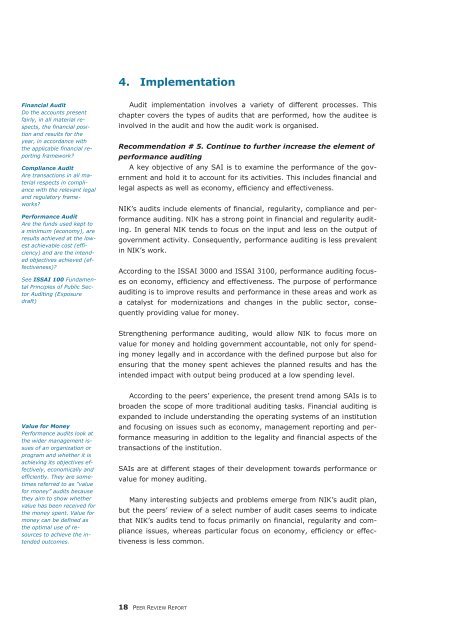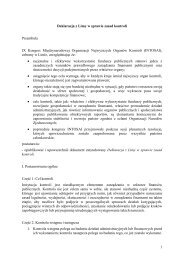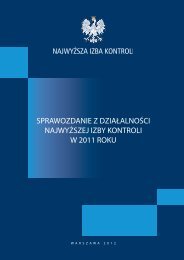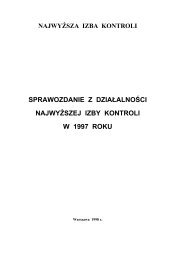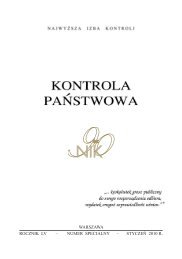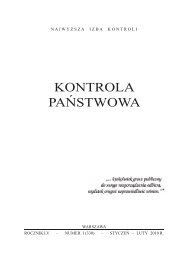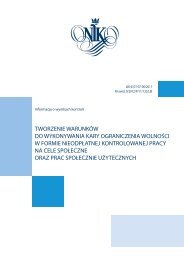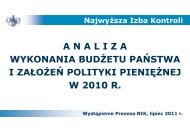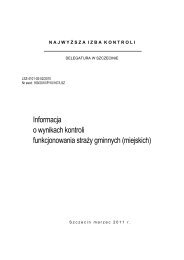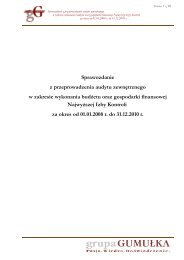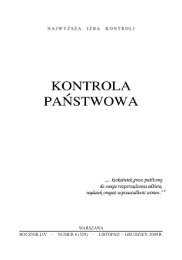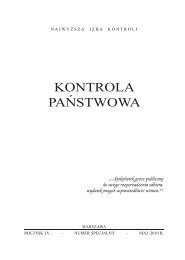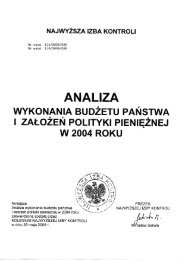NIK peer review report - Najwyższa Izba Kontroli
NIK peer review report - Najwyższa Izba Kontroli
NIK peer review report - Najwyższa Izba Kontroli
You also want an ePaper? Increase the reach of your titles
YUMPU automatically turns print PDFs into web optimized ePapers that Google loves.
4. ImplementationFinancial AuditDo the accounts presentfairly, in all material respects,the financial positionand results for theyear, in accordance withthe applicable financial <strong>report</strong>ingframework?Compliance AuditAre transactions in all materialrespects in compliancewith the relevant legaland regulatory frameworks?Performance AuditAre the funds used kept toa minimum (economy), areresults achieved at the lowestachievable cost (efficiency)and are the intendedobjectives achieved (effectiveness)?See ISSAI 100 FundamentalPrinciples of Public SectorAuditing (Exposuredraft)Audit implementation involves a variety of different processes. Thischapter covers the types of audits that are performed, how the auditee isinvolved in the audit and how the audit work is organised.Recommendation # 5. Continue to further increase the element ofperformance auditingA key objective of any SAI is to examine the performance of the governmentand hold it to account for its activities. This includes financial andlegal aspects as well as economy, efficiency and effectiveness.<strong>NIK</strong>’s audits include elements of financial, regularity, compliance and performanceauditing. <strong>NIK</strong> has a strong point in financial and regularity auditing.In general <strong>NIK</strong> tends to focus on the input and less on the output ofgovernment activity. Consequently, performance auditing is less prevalentin <strong>NIK</strong>’s work.According to the ISSAI 3000 and ISSAI 3100, performance auditing focuseson economy, efficiency and effectiveness. The purpose of performanceauditing is to improve results and performance in these areas and work asa catalyst for modernizations and changes in the public sector, consequentlyproviding value for money.Strengthening performance auditing, would allow <strong>NIK</strong> to focus more onvalue for money and holding government accountable, not only for spendingmoney legally and in accordance with the defined purpose but also forensuring that the money spent achieves the planned results and has theintended impact with output being produced at a low spending level.Value for MoneyPerformance audits look atthe wider management issuesof an organization orprogram and whether it isachieving its objectives effectively,economically andefficiently. They are sometimesreferred to as “valuefor money” audits becausethey aim to show whethervalue has been received forthe money spent. Value formoney can be defined asthe optimal use of resourcesto achieve the intendedoutcomes.According to the <strong>peer</strong>s’ experience, the present trend among SAIs is tobroaden the scope of more traditional auditing tasks. Financial auditing isexpanded to include understanding the operating systems of an institutionand focusing on issues such as economy, management <strong>report</strong>ing and performancemeasuring in addition to the legality and financial aspects of thetransactions of the institution.SAIs are at different stages of their development towards performance orvalue for money auditing.Many interesting subjects and problems emerge from <strong>NIK</strong>’s audit plan,but the <strong>peer</strong>s’ <strong>review</strong> of a select number of audit cases seems to indicatethat <strong>NIK</strong>’s audits tend to focus primarily on financial, regularity and complianceissues, whereas particular focus on economy, efficiency or effectivenessis less common.18 PEER REVIEW REPORT


